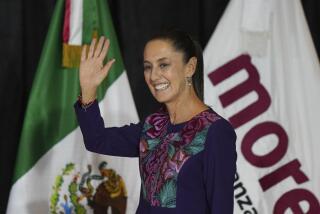Third World and U.S. Election
- Share via
As physicians working in international public health, my colleagues and I tend to view discussions of national and foreign politics as anathema, avoiding them much as we might try to avoid contracting an infectious disease. It was thus quite refreshing, in an era where foreign leaders openly endorse U.S. presidential candidates and political pundits abound like viruses, to hear the unsolicited views of common people from the Third World about their presidential preferences. Two tales in this regard might interest your readers.
One of my colleagues was working in the remote mountains of Chile in 1976 during the presidential election. He had lost touch with current events in the States, and in fact, the election had slipped from his mind as he pursued the objectives of his assignment. He was thus amazed one morning to find a congregation of jubilant village people awaiting him as he opened his door to begin the day’s work. They had prepared an enormous cake for him, which was to thank him personally for electing Jimmy Carter to the presidency.
Three weeks ago I was on a bus from Tanzania to the eastern coast of Kenya. The bus broke down mid-trip, and my companion and I had used the last of our local currency to purchase the tickets. Eventually, another bus came along and offered transport for an additional 8 schillings. We could only turn to the first bus driver for assistance. As my companion approached the driver requesting money, he inquired about her nationality. When she replied that she was an American, the elderly man gently grasped her hand, counting out the schillings to her open palm. He looked very intently into her eyes, and said, “Please vote for (Michael) Dukakis.”
I’m not quite certain what these anecdotes mean, but they are far from uncommon. A paradox is evident in that citizens of the supposedly uneducated, ignorant Third World are better informed about how presidential elections will affect their lives than American voters are. “Leader of the Free World” isn’t just an abstract notion or catchy buzz word to these people, it is a concrete reality.
It might be time to let the pundits and foreign politicians take a breather. We might get a better intuitive sense about the nature of a prospective President by listening to the reactions of people whose very survival may be connected to that man’s personality. There ain’t a lot of apathy in the Third World.
GEORGE GELLERT, M.D.
Los Angeles
More to Read
Get the L.A. Times Politics newsletter
Deeply reported insights into legislation, politics and policy from Sacramento, Washington and beyond. In your inbox three times per week.
You may occasionally receive promotional content from the Los Angeles Times.










